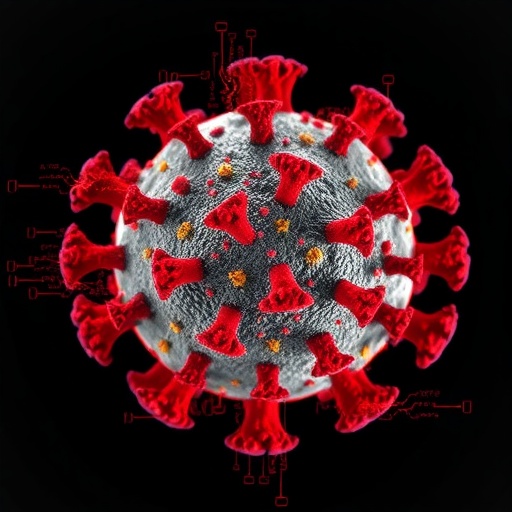
The recent research conducted by Das and colleagues sheds light on a crucial component of Zika virus biology: the Envelope Domain III (EDIII) protein. This component plays a significant role in the virus’s infectivity and the host immune response. By understanding the structural and functional properties of this protein, scientists aim to advance the development of effective vaccines and therapeutic interventions against Zika virus, an arbovirus that has garnered considerable attention due to its association with neurological disorders.
The purification and refolding of the EDIII protein are fundamental steps in the research process. When expressing recombinant proteins, particularly from viruses like Zika, the proteins often misfold or aggregate. Thus, the purification process becomes critical to obtain a biologically active form of the protein. In this study, advanced chromatographic techniques were utilized to isolate the EDIII protein from bacterial expression systems while ensuring that its structural integrity remains intact. This meticulous process not only guarantees the specificity of the protein but also sets a standard for subsequent biochemical assays.
Following purification, the focus shifted toward the refolding of the EDIII protein. Refolding involves restoring the protein’s functional conformation after denaturation or misfolding. The researchers employed a series of refolding conditions that were systematically altered to identify optimal conditions that would facilitate proper folding. This is a complex balance where factors such as temperature, pH, and folding aids like solvents must be meticulously controlled. The outcomes revealed the delicate nature of the EDIII protein and the necessity of precision in the refolding process to yield a functional product.
.adsslot_QUJ0ZzO2oL{width:728px !important;height:90px !important;}
@media(max-width:1199px){ .adsslot_QUJ0ZzO2oL{width:468px !important;height:60px !important;}
}
@media(max-width:767px){ .adsslot_QUJ0ZzO2oL{width:320px !important;height:50px !important;}
}
ADVERTISEMENT
Understanding the stability of the EDIII protein across various pH levels is an essential aspect of evaluating its potential as a vaccine candidate. Proteins can undergo structural changes and lose their functionality outside their native pH environment. Das and her team conducted pH-dependent stability assays, using circular dichroism and differential scanning calorimetry, to investigate how variations in pH affect the protein’s conformation and stability. Their results indicated that the EDIII protein demonstrates a surprising resilience to changes in acidity, suggesting its viability for formulation in vaccine platforms that might experience shifts in pH during storage and administration.
The implications of this study extend far beyond basic science, as they pave the way for the rational design of Zika virus vaccines. With the rise of dengue and Zika outbreaks, there is an urgent need for vaccines that can provide robust protection. By comprehensively analyzing the EDIII protein, this research contributes valuable insights into how immune responses can be effectively elicited. Such knowledge is critical when trying to develop a vaccine that induces neutralizing antibodies, as the EDIII domain is often targeted by the immune system.
Moreover, this exploration also encompasses the potential of the EDIII protein to serve as a diagnostic tool. Highly purified, correctly folded proteins are crucial for developing serological assays that can distinguish between Zika and other flavivirus infections, such as dengue. This not only aids in diagnosis but also enhances tracking and monitoring of outbreak dynamics, ultimately contributing to public health responses.
The work on EDIII protein also highlights the role of interdisciplinary collaboration in advancing viral research. The methodologies employed in this study—from protein engineering to biochemical assays—require expertise in various fields, including molecular biology, virology, and immunology. Such collaborative efforts can accelerate the progress in understanding Zika virus and, by extension, other related viruses that pose significant threats.
Furthermore, this research showcases the importance of understanding viral proteins in the context of immune evasion. Zika virus, like other flaviviruses, has evolved mechanisms to escape host immune detection. By elucidating the structural characteristics of the EDIII protein, scientists can begin to unravel these complex interactions, thereby informing strategies to enhance vaccine design and efficacy.
As the research landscape continues to evolve, it is imperative for studies like this to communicate findings effectively to the public and the scientific community. By disseminating information about the complexities of viral proteins and their interactions with host systems, researchers can foster greater awareness of viral threats and inspire future research directions.
The ongoing efforts in Zika virus research reiterate the urgency of preparedness against emerging and re-emerging viral diseases. With increased globalization and climate change influencing the spread of vectors, understanding the molecular biology of viruses like Zika becomes paramount. In this context, the work by Das and her team represents a building block in the foundation needed to combat future outbreaks.
In conclusion, the purification, refolding, and stability assessment of the Zika virus EDIII protein detailed in this study provide essential insights that extend across multiple implications for vaccine development and diagnostics. As more researchers engage with the complexities of viral proteins, the scientific community moves closer to advancing effective strategies to mitigate the impact of arboviral diseases globally.
Subject of Research: Zika virus EDIII protein purification and stability
Article Title: Purification, refolding, and pH-dependent stability evaluation of Zika virus EDIII protein
Article References:
Das, M., Kumar, V., Madhukalya, R. et al. Purification, refolding, and pH-dependent stability evaluation of Zika virus EDIII protein.
Int Microbiol (2025). https://doi.org/10.1007/s10123-025-00679-y
Image Credits: AI Generated
DOI: https://doi.org/10.1007/s10123-025-00679-y
Keywords: Zika virus, EDIII protein, protein purification, refolding, pH stability, vaccine development, viral proteins.
Tags: advanced chromatographic methodsEnvelope Domain III proteinhost immune response to Zikaneurological disorders and Zikaprotein purification techniquesprotein refolding processesrecombinant protein expressionstructural biology of virusestherapeutic interventions for Zikavaccine development for Zika virusviral infectivity mechanismsZika virus research





